 'Socially responsible film maker' seems to be his tag. People talk of his brilliant exploration of social issues, of his technical superiority, of the superb performances he extracted from his actors, etc. etc. All this gives one the impression that he was the party-pooper of the decade that was the 70s; that he made "meaningful" cinema which was too artistic to be enjoyed by any but the very intellectual classes (whoever they might be). Of course, there is no denying that his films were socially responsible, that they did have great performances, that they were artistically made. But what all these tags do not reveal is that his films were actually interesting and fun to watch, that he is a brilliant story teller, that his films have a sense of humor that helps you over the grim parts, without ever trivialising the subject.
'Socially responsible film maker' seems to be his tag. People talk of his brilliant exploration of social issues, of his technical superiority, of the superb performances he extracted from his actors, etc. etc. All this gives one the impression that he was the party-pooper of the decade that was the 70s; that he made "meaningful" cinema which was too artistic to be enjoyed by any but the very intellectual classes (whoever they might be). Of course, there is no denying that his films were socially responsible, that they did have great performances, that they were artistically made. But what all these tags do not reveal is that his films were actually interesting and fun to watch, that he is a brilliant story teller, that his films have a sense of humor that helps you over the grim parts, without ever trivialising the subject.For me, the Shyam Benegal love started in the 80s with his lovely tele serial Yatra. It was an almost-anthology of tales set within the compartments of a train, journeying from Kashmir to Kanyakumari and back. It sketched the stories of the people who boarded the train in a few beautiful strokes - through their actions and interactions within the train compartment. Yes, it was brilliant film making, but more important to my masala-fed kiddie self, it was fun and interesting. It felt like I was really meeting all these people and getting to know them.
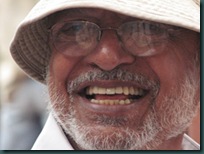 As I grew up, I saw more Benegal, since Indian TV used to bring him on quite often. It was seeing Mandi (1983), his brilliant social satire, that finally got me interested in hunting up more Benegal films and also more "art" films. Hey! if they were all as much fun as Mandi, then everybody was WRONG and art films were definitely must-see! Thanks to Benegal, I "discovered" Satyajit Ray, Prakash Jha, Girish Karnad, Govind Nihalani, et al – in other words, the world of parallel cinema. And Benegal himself was parallel cinema for Hindi films in the 70s and contributed significantly to the wealth of filmi variety thereof.
As I grew up, I saw more Benegal, since Indian TV used to bring him on quite often. It was seeing Mandi (1983), his brilliant social satire, that finally got me interested in hunting up more Benegal films and also more "art" films. Hey! if they were all as much fun as Mandi, then everybody was WRONG and art films were definitely must-see! Thanks to Benegal, I "discovered" Satyajit Ray, Prakash Jha, Girish Karnad, Govind Nihalani, et al – in other words, the world of parallel cinema. And Benegal himself was parallel cinema for Hindi films in the 70s and contributed significantly to the wealth of filmi variety thereof.Let me tell you up front, I dont wish to discuss the significance of his films, either to cinema history or to social awareness. I do not want to talk about the technical brilliance of his film making, or analyse his undoubtedly big impact on 20th century cinema. We’ll take that as given. Instead, I’ll concentrate on what a masala-loving film-buff like me finds in his films.
The thing I enjoy most about his films is how tautly the story is told – your attention is caught and held as the story unfolds. There are no unnecessary diversions or loss of focus, to dilute the impact of the story. The characters themselves are so well sketched and executed that you cant help but be interested in them and be curious about their fate. The other aspect of his work that I love is the sheer diversity of subjects and plots in his films. You cant watch one of his films and predict how the rest of them will turn out! Just take a look at his 70s filmography – there is so much variety in the films he made.
He started out in 1974, with the moving Ankur. This sad tale of a rural inter-caste affair was the seedling from whence sprang the tree of parallel cinema. He followed it up in 1975, with a children’s movie Charandas Chor and Nishant. Charan Das Chor was an adaptation of a folktale and had everything a child might desire - kiddies, princesses, honest thieves, spirits, magic… In a complete change of gears, Nishant, was a look at feudal tyranny in rural India, seen through the lens of a village woman abducted for the pleasure of the local land-owner.
1976 brought us Manthan, the story of how Dr. Kurien helped dairy farmers organise themselves into a farmer’s cooperative which gave India our beloved Amul Dairy and ushered in the White Revolution (that refers to milk, not skin color!). Next came Bhumika (1977) – the life-story of a 1940s actress, in search of freedom and self-fulfillment. In 1978, Benegal made two films – a period drama Junoon, and Kondura (released in Telugu as Anugraham) a modern mythical tale.
Junoon (1978)
 Amongst Benegal’s 70s films, this is my favorite. It has everything that I usually require from a period film – a gripping plot, realistic historical context, characters that tend towards grey rather than black and white, subtle acting, and dialogues written in sensible but pretty, rather than stylised, language. In short, my preferences run more to a North and South than a Mughal-e-Azam, and this one fits the bill beautifully.
Amongst Benegal’s 70s films, this is my favorite. It has everything that I usually require from a period film – a gripping plot, realistic historical context, characters that tend towards grey rather than black and white, subtle acting, and dialogues written in sensible but pretty, rather than stylised, language. In short, my preferences run more to a North and South than a Mughal-e-Azam, and this one fits the bill beautifully. 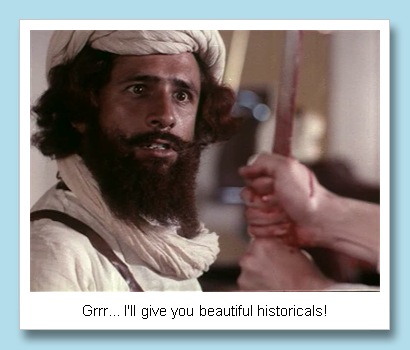
Its 1857, the time of the First War of Indian Independence. Indian soldiers have driven out the British forces in a number of places. In a small town in Northern India, the Anglo-Indian Labadoor family loses the man of the house in a brutal attack by the Indian soldiers. The Labadoor women – Mariam (Jenniffer Kendall), her daughter Ruth (Nafisa Ali), and her mother (Ismat Chugtai) - are captured by Javed Khan (Shashi Kapoor) for the Indian side. But Javed has more than a freedom struggle on his mind. He’s been obsessed with Ruth for a while, and seizes this opportunity to propose marriage. Mariam objects that the British forces will prevail eventually. What’ll happen to Ruth then, married to a known British enemy? Besides, she isnt keen to marry off her daughter to a man who is already married. They negotiate and strike a bargain – if the Indian side wins, Javed can marry Ruth.
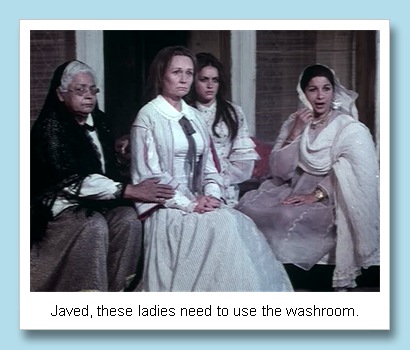

Its the sort of film where knowing which side eventually won, wont tell you how the personal conflict will get resolved! Thats because there are real people involved – people with changeable emotions and perspectives. As the Labadoor women spend time with their Indian jailors, treated more as welcome guests than prisoners, they learn to look upon their Indian acquaintances as persons like themselves, rather than as exotic 'others'. The Indians, for their part, arrive at the same place. There is growing rapprochement and even affection, on both sides – something thats thrown into sharp relief against the death and destruction that is going on all around them. And then there is the depiction of brutality… Used as I was to popular Hindi films that depict the Britishers as blood-thirsty and sadistic villains, while the Indians are always cast in the noble martyr/freedom fighter mould, this film surprised me with its balanced perspective. It shows the brutality of the British side, but it doesnt spare the Indians, either.
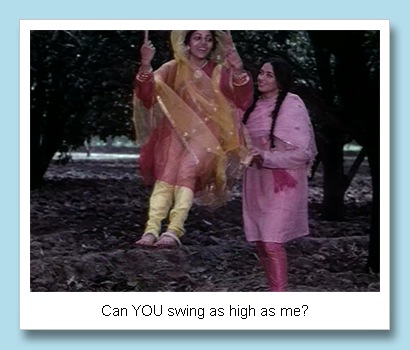
If the characters’ interpersonal interactions are the best thing about this film, its the well sketched characters who make it memorable. Though its Jenniffer’s performance as Mariam that I love most, the character that stays with me more, is that of Javed. He is, by far, the most enigmatic character in the film. You can read the emotions and motivations of the others, but with Javed, its not so easy. He seems to be obsessed with Ruth, and clearly wants her very badly. Yet, when he has her completely in his power, he negotiates and bargains, even pleads, but never ever resorts to force. Which begs the question, is he really such a principled gentleman that he wont forcibly take what he wants? Or is it that he doesnt really want Ruth?
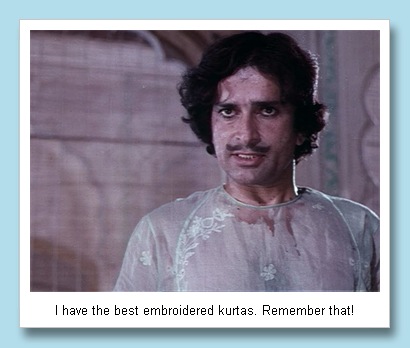
The film closes with an end that leaves more questions than it answers - and that is probably what makes this film so haunting. You keep wondering why Javed did what he did in the end. (If you dont mind spoilers, check out this discussion of the ending, on Bollywhat) A great example of Benegal’s story telling expertise!
There’s reams more that can be written about this film in particular, and Benegal’s cinematic classics, in general. But I’ll sign off with this astute comment from an imdb user on the Bhumika thread:
[Benegal] combin[es] the vibrant, visual energy of Bollywood, the depth of character of Ray, with a narrative complexity, formal daring, and willingness to experiment, alien to both.
And thats why he gets so much love on Old is Gold!

A zillion more movies to add to my queue! 70s week is teaching me so much!
ReplyDeleteGood write-up on Junoon. Nafisa Ali is Jennifer's daughter--but they are about the same age no? I'll watch it based on your recommendation. I saw Manthan when it came out. I was very young but a very serious kid. But maybe it was too serious even for me.
ReplyDeleteI'm yet to discover more of his works his only film i've seen so far is Zubeidaa which didn't sit quite well with many but I loved it, i really have to check out his early stuff as he worked quite a lot with one of my favourite actresses Smita Patil
ReplyDeleteBeth, if you only stuck to 70s, you'd still never run out of movies to watch! The 70s week is your best idea EVER!!!!
ReplyDeletesophy, I think Nafisa Ali was only in her early twenties when Junoon was made, and Jennifer was in her mid forties. So, they were age-appropriately cast as mother-daughter. Do try to watch it - its a lovely film.
I too watched a lot of serious movies as a kid because DoorDarshan used to telecast them in regular movie hours. I remember enjoying Manthan back then. It had colorful costumes and villagers who mispronounced words like "society" (I think they call it "sissotty") - enough to keep me amused! I need to rewatch to get a grown-up perspective.
bollywooddeewana, I was also a bit disappointed with Zubeida because the character herself was rather annoyingly kiddish, and also because I usually have high expectations of Benegal films. But compared to most other contemporary films, it was certainly a superior work of cinema and the songs were lovely. For Smita, try to watch Mandi - it also has a lot of other famous parallel cinema actors, and its a really interesting film.
I need to watch Yatra stat! And you know I totally agree on Junoon. And not just because I'm a fangirl either! What strikes me about Benegal is that he's still an unique voice. His movies are so distinct in their POV and character from everything else - AND they managed to be a commercial success more often than not! Amazing.
ReplyDeleteAmrita, let me know if you find Yatra. It doesnt seem to be available on VCD/DVD.
ReplyDeleteAnd Benegal's commercial success just goes to prove how much masala (i.e., fun) he adds to his films! ;-)
There you see: Twenty Naach uthe sansar meant one Junoon for poor ol' Shashi!
ReplyDeleteI haven't seen Junoon :-(. I remember watching a bit on Doordarshan but had a power cut and couldn't watch the rest of it. I must go hunting for them. I had picked up Bhumika few months back, but there was some problem with the dvd, so couldn't watch that either.
ReplyDeleteharvey - twenty Naach Uthe Sansar IS a very high price to pay. Poor Shashi, indeed! :-)
ReplyDeletesunheriyaadein, you do seem to have had trouble with Shyam Benegal! Keep trying... Mehnat ka phal hamesha meetha hota hai!
Regarding 'Zubeida', which was discussed in the comments above, I read somewhere that the story was based on the life of the mother of Khaled Mohammed, an Indian film critic. So I guess Benegal couldn't really have made it any better! I didn't think the story was great but I still enjoyed the movie.
ReplyDeleteYes, I heard that it was based on Khaled Mohammed's Mom, too. I didnt like the film as much as I should have, because Zubeida was such an annoying character - but then the real-life Zubeida died before she turned 18, so her annoying childishness was perhaps real. The other problem was Manoj Bajpai - he just didnt seem to fit his role as the Maharaja. I wish Benegal had cast a better actor. Perhaps I'll like the film better on a re-watch...
ReplyDelete"It shows the brutality of the British side, but it doesnt spare the Indians, either."
ReplyDeleteWell, it was a fight against the tyrannical British, so I find your above comment somewhat askance/misplaced. In a war, people kill and get killed, and killing is always brutal.
And why can't Indians be "brutal" (if you are equating 'participating in a battle/war' as 'being brutal')? It's not as if Indians haven't shied away from warfare, and our history/mythology is filled with warriors, be they Shri Ram, or Parshuram, or Arjun, or Shivaji, or Maharana Pratap who vanquished their enemies.
That wasnt a comment on Indians' right to brutality, Amit. Popular depiction of the freedom struggle in India (films, stories, comics, etc.) usually depict Indians (of the Raj) only as martyrs and long-suffering victims (which they usually were, though not always), while popular English media (books and films) usually show Indians as either servile idiots or exotically mystic people. So its nice to see a fairly mainstream film (if I may call a Shyam Bengal film that!) go for a more balanced view.
ReplyDeleteHi Bollyviewer,
ReplyDeleteThanks for all these suggestions, I'll definately try to get hold of some of these - just thinking of Shyam Benegal sends my heart racing full of excitement.
cheers!
yves
"just thinking of Shyam Benegal sends my heart racing full of excitement."
ReplyDeleteMe too! :-) I cant wait to see his latest - Well Done Abba.
I have never heard of the TV series Yatra. Perhaps it was made and aired after I left India. I wish it was available on DVD, I would love to watch it.
ReplyDeleteShyam Benegal, Govind Nihalani, Girish Karnad et all are my fav filmakers from the 70s.
I haven't seen Junoon. Welcome to Sajjanpur and Well done ABBA are in my tBW pile!
Another excellent Shyam Benegal movie produced by Sashi Kapoor is "Kalyug". Those who are familiar with the broad Mahabharata story will be able to identify the contemporary characters. Anant Nag, Sashi, Victor Banerjee, Supriya Pathak, Rekha - all did an excellent job.
Filmbuff, Kalyug is a very big favorite on OiG - especially for Shashi Kapoor's 'Karan Singh'. :D You definitely must catch up on more Benegal, and Well Done Abba and Welcome To Sajjanpur are excellent choices. I think Junoon is a much better film - but then, I LOVE period dramas.
ReplyDeleteI have seen a no of Benegal movies - Manthan, Bhumika, Mandi, Ankur etc.
ReplyDeleteI also liked Govind Nihalani's Ardh Satya and Akrosh.
Albert Pinto ko gussa kyon aata hai was also a good movie
I haven't seen Ardh Satya and Aakrosh, though I do love Nihalani films. His films are often quite dark (Vijeta was an exception) and leave me feeling a bit depressed, something that never happens with Benegal. :D
ReplyDeleteAlbert Pinto Ko Gussa Kyon Aata hai I saw back in the 80s DD days and have vague memories of Nasseer losing his temper all over the place, especially over poor Shabana's wearing a skirt and riding pillion on his bike!
Pls do see Aakrosh and Ardh Satya. They are hard hitting movies but really good. The title music esp is too good in these movies. One of them has a melodious classical title song " kahna re, peed sahi na jaye re".
ReplyDeleteI have been searching for Sparsh for a long time but couldn't find the DVD in Hyd during my recent visit. That is one Naseer-Shabana movie I would love to see.
Sparsh is definitely not a film one must miss. So very beautiful... You can get it from Induna.
ReplyDeleteI will try to locate Aakrosh and Ardh Satya.